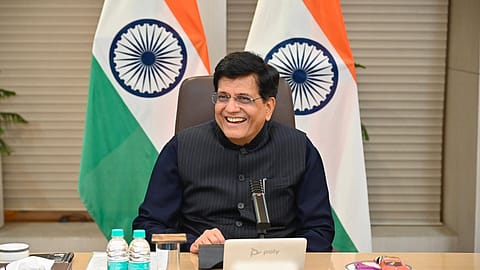India and Africa can double trade by 2030: Piyush Goyal calls for tie-ups in minerals, agri-tech, digital infra
Piyush Goyal, speaking at the CII India-Africa Business Conclave, emphasised the importance of focusing on critical minerals, agri-tech, and digital infrastructure, suggesting that such collaborations could help both regions overcome global trade challenges and enhance their economic standing.

Commerce Minister Piyush Goyal, speaking at the launch of the CII India–Africa Report 2025 during the CII India-Africa Business Conclave in New Delhi today, urged African countries to generate complementarities with India and double the trade between the two regions by 2030. “Looking at the current geopolitical situation across the world, this is the ideal opportunity for us to relook our engagement with each other and see how we can have certain focus sectors, where Africa can support India (critical minerals, petroleum products, etc) and vice versa (food security, technology upgradation, manufacturing, agriculture),” Goyal said.
The Union minister's statement comes in the backdrop of the US imposing 50% tariffs on Indian exports, which is set to hurt the Indian exports in a big way. Approximately 55% of India’s US-bound shipments (worth $47–48 billion) are now exposed to pricing disadvantages of 30–35%, say experts. Trump tariffs will also render India's goods uncompetitive in comparison to its competitors from China, Vietnam, Cambodia, the Philippines and other Southeast and South Asian countries. Considering these challenges, the government has called for Indians to consume more 'Make in India' products and urged global companies to make products in India.
Here are the key points discussed during the event to increase the overall trade between the two regions.
India's tech solutions and Africa’s critical mineral export: India can provide tech driven solutions, drones, AI yield prediction technologies, soil health studies, better seeds, pesticides, insecticides, fertilisers to help Africa enhance productivity and increase farmers’ income, says Goyal. “We can look at supporting Africa in value addition, so together, African and Indian companies, instead of exporting raw material or raw agricultural products from Africa, can start supplying processed foods to the entire world,” Goyal said. He said Africa’s critical mineral sector can fuel partnerships on battery and solar and renewable energy ecosystems. He also called for tie-up in the services sector, especially on payment gateways, saying UPI could bring down cost of financial transaction and remittance.
Africa can be a powerful bloc: Goyal said Africa can become a powerful bloc at multilateral organisations that can influence global decisions. "The Global South is the voice of the developing and less developed world," he said. Francis Mwebesa, Minister of Trade, Industry and Cooperatives, Republic of Uganda, said there is a need for collaboration among countries in Africa, and trade as a bloc, not individual countries, in order to leverage the African Continental Free Trade Area. “We need to explore ecosystems in various countries to support value chains. This will provide us with a framework to foster meaningful partnerships between Africa and India,” he said.
Gambia calls for tie-ups with Indian enterprises: Baboucarr O Joof, Minister of Trade, Industry and Employment, Republic of The Gambia, said India has shown how technology and enterprise can be harnessed to leapfrog developmental challenges. He said he has explored innovative solutions that Indian enterprises can offer and identified various areas for potential collaboration, including agriculture, manufacturing, tourism, renewable energy, healthcare, logistics and supply chain development. "The Gambia is ready to build a brighter future with the government and businesses of India and Africa."
Global use-cases of DPI: Rajiv Memani, President, CII and Chairman & CEO, EY India, said the Digital Public Infrastructure (DPI) can provide a digital layer of growth and inclusivity at the population scale. R Mukundan, President Designate, CII and MD & CEO, Tata Chemicals Ltd, suggested a BRIDGE framework to overcome challenges and build partnerships together: B – build trade channels, R – reinforce private participation, I – invest in green energy, D – develop human capital, G – grow financial education, and E – enhance infra and value chain.